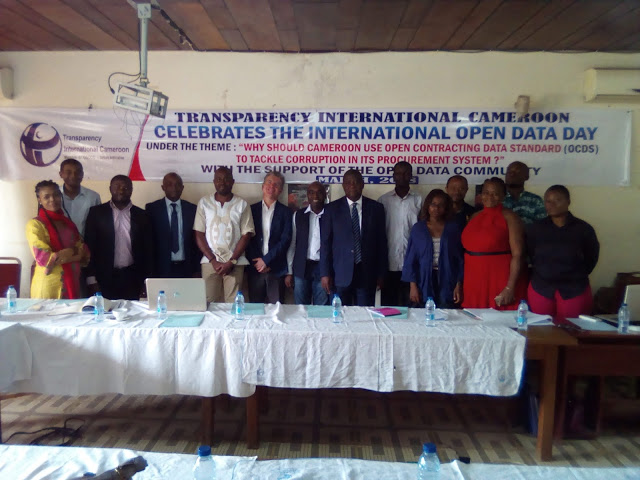This blog was written by Rodrigo Valdez (Girolabs) and Transparency International Cameroon.
This blog is part of the event report series on International Open Data Day 2018. On Saturday 3 March, groups from around the world organised over 400 events to celebrate, promote and spread the use of open data. 45 events received additional support through the Open Knowledge International mini-grants scheme, funded by Hivos, SPARC, Mapbox, the Hewlett Foundation and the UK Foreign & Commonwealth Office. The events in this blog were supported through the mini-grants scheme under the Follow the Money theme.
Open Data Day #Unconference Asunción 2018
On March 3, along with other hundreds of cities, we celebrated Open Data Day in Asunción, Paraguay. For the third year in a row, the Girolabs team took the initiative to bring together people passionate about open data; as always it turned out to be a remarkable event.
We decided to get together at Loffice Bulnes. This is the biggest coworking space network in the country and Bulnes is a space dedicated to entrepreneurship and social development, where Girolabs was born and has grown as a company, and where whe share space with other enterprises.
This year we decided to innovate the format of the event so we organized an Unconference. What does this mean? Basically, it’s a model to break the common dynamics where few people speak. During an unconference, there is an open opportunity for everyone to speak and listen. It’s easier to understand if we tell you how it happened:
First, the participants developed the program for the day. They chose the topics to discuss. Everyone had a possibility to suggest up to four topics and put them on the wall with a post-it. This way we made sure to include everyone’s interests in the dialogue.
After this we grouped people by topic, putting the common topics together and identifying others. Through this we got to three main topics that guided us through the afternoon sessions:
- Enterprise Open Data and Innovation
- Government Open Data and the new Action Plan
- Politicians and Elections Open Data

Once we got the big picture of the topics, we assigned three tables to have conversations simultaneously. Each person could decide where to join and we speaking rounds to make sure everyone could speak. This way people participated in two different tables, with different people. Each table had a moderator guiding the conversations.
On the Government Open Data table we had Federico Sosa, the General Director of Open Government moderating and they gathered many proposals to include in the new Action Plan, which will be executed by mid-year.
The Innovation and Enterprises table with Margarita Rojas focused on innovation through data science and big data in companies, as well as the importance of the data that companies hold and how it can help improve the commercial experience and life quality. A topic that also came up quite strongly was the need to bring academia and open data together, particularly through a thesis repository, so people can take advantage of these documents that tend to be stored in university libraries.
In the third table, the A Quienes Elegimos team lead the politics conversation. A few days before national elections, the topics of transparency and civic engagement resonated quite strongly with participants. Two factors were that thanks to open data, we can help people understand who represents them, participate and vote consciously.
To finalize each table presented their topics and we had an open mic so participants could present their own projects. Among them, SENATICS presented their achievements and challenges regarding open data. The developers of the Ministry of Finance and the Public Procurement Office presented the portals they built and the importance of using them to track public money.
For one more year, we have proven that spaces like Open Data Day are very valuable for people, but specially it becomes clear how much work there is left to do. As a community, we expect to keep creating spaces where people, CSOs and government can talk in a convivial way.
Transparency International Cameroon celebrates the 8th edition of the Open Data day with a focus on the Public Procurement sector
Transparency International-Cameroon (TI-C) on Friday March 16 hosted an information and awareness raising workshop to celebrate the 8th edition of the International Open Data Day. Under the theme “Why should Cameroon use the Open Data Standards for Procurement to Combat Corruption in its Public Procurement System?”, the workshop organized with the financial support of the Open Data Community gathered representatives from the government, media, local councils, civil society organizations and technical and financial partners.
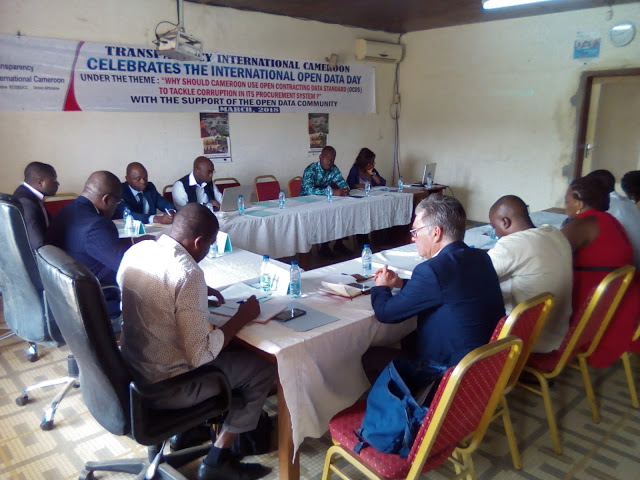
The workshop was a combination of presentations and interactive sessions. The participants had their capacities strenghtened through the following presentations:
- Corruption in the public procurement sector in Cameroon: Causes, Manifestations and consequences. An expert from Transparency International Cameroon provided the participants with facts and figures on corruption in the public procurement sector.
- Understanding the Open Contracting Data Standard (OCDS). With the presence of an expert on open data issues, the participants were able to have a better comprehension of “open data”, “open Contracting”, and “open contracting data standard”. The expert went further in his presentation to demonstrate how OCDS can help promote transparency and integrity in the public procurement sector.
- Open Data and the fight against corruption: the nexus. In this presentation and taking into consideration the context of Cameroon, the expert from transparency International presented the advantages of “open data” and “OCDS” in contributing to the reduction of corruption in the procurement sector. He went further to demonstrate how open data can help mitigate some corruption risks.
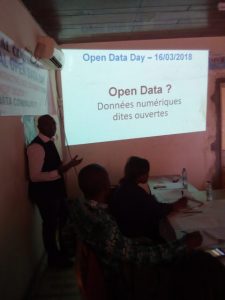
In the context of Cameroon, the key questions was, how can civil society organizations promote OCDS? While brainstorming on the question, participants realized that there are challenges to be addressed to facilitate the adoption of OCDS by government agencies. Among them we have:
- The absence of an information law: Cameroon does not yet have a law that could allow citizen to have access to information wherever they are and for whatever purpose. This has been identified as a major challenge in promoting OCDS.
- Non-adherence to international initiatives on Open Data: The country has not joined some of the recent initiatives aiming at facilitating and promoting open data. For instance Cameroon is not a member of the “Open Government Partnership”.
- Weak technical expertise from government and Civil society organizations: Implementing open data or open contracting data required a specific skill which is lacking at the national level. Therefore there is need to strengthen the capacities of stakeholders before preparing them to the use of open data tools.
- Poor knowledge of open data concepts and tools by the final beneficiaries: Participants believed that data are very sensible and if not well used can become a weapon. Therefore the questions raised were: (i) are citizens prepare to receive some data? (ii) And are they equipped to analyze the data? To these questions, participants expressed the need to educate citizens on open data and to conduct a sort of open data comprehension index as well.
The event was broadcasted on a national TV station during the Evening news the same day, also, one of the journalist present during the workshop had two articles published in its newspaper (Le quotidian l’Economie).
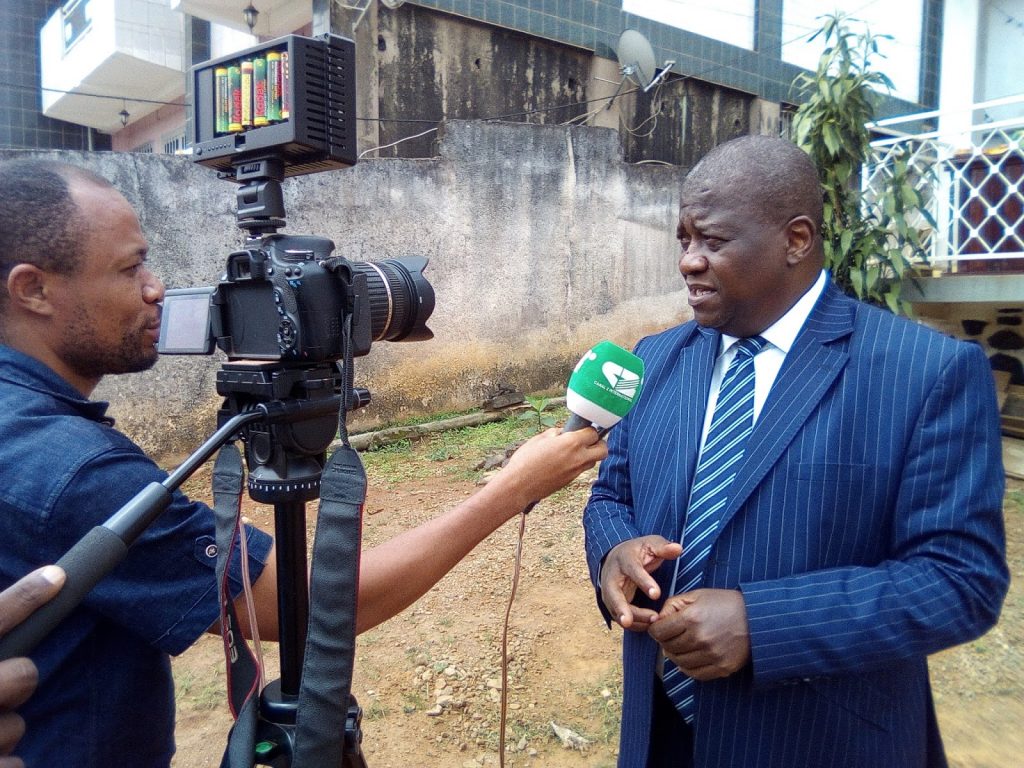
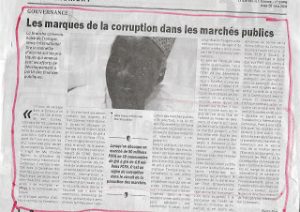
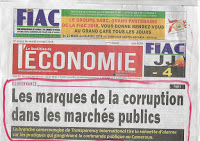
We should however underline here that this workshop is in line with the missions of the recently established “Open Contracting Working Group – Cameroon” composed mainly of three Cameroonian civil society organizations namely: Transparency International Cameroon, AfroLeadership and CRADDEC.
